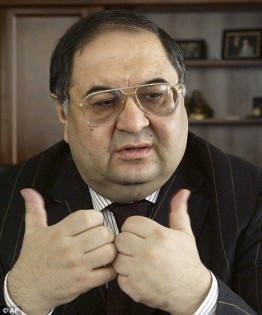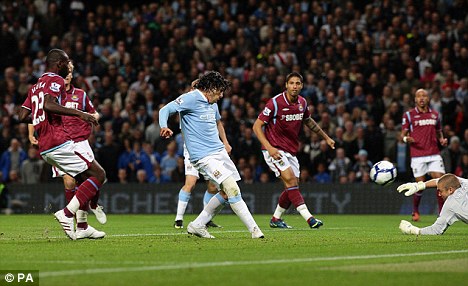Bungling foreign owners serve up more competitive Premier League — at either end of the table
How many words does it take to point out that foreign owners at the top and bottom of the Premier League have given hope to the rest of the competition? Err… quite a few apparently. Nevertheless, the likes of Tom Hicks and George Gillett have somehow managed to make the league far more interesting this season…
When the influx first looked like coming, foreign ownership of clubs was rallied against as the beginning of the end for English football — with dire warnings that fans would lose the connection with their local club as the sport became more about making money than providing entertainment.
The same was said of foreign players, of course, when they suddenly began descending on their Premier League around 15 years earlier.
The likes of Eric Cantona and Dennis Bergkamp would obstruct English talent from shining, it was widely believed. In fact, the opposite has been proven to be true, as the many others who followed those legendary players to English shores have helped improved the native technique and ability beyond almost all recognition.
Few predicted the Premier League would get stronger with foreign players but, having contributed Champions League finalists in each of the last five seasons, that has proven to be the case.
Few predicted foreign ownership would lead to a more competitive league but, perhaps belatedly, even unexpectedly, that is suddenly becoming the case.
After all, some of the traditional powerhouses of English football have seemingly been handicapped by their foreign owners in recent times, while others from the middle of the English pack have been able to burst forward under the ambitious direction of new men in charge.
In the former corner, unfortunately for their long-suffering fans, is Liverpool. Just this week Rafa Benitez, the club’s beleaguered manager, attempted to deflect attention away from his own troubles by admitting publicly what everyone already suspected about the way the club is now run:
“One of the priorities this year was to reduce the debt so the club is working very hard to do this and I think that our position will be much better,” the Spaniard said.
“We were doing a very good job this year trying to reduce the debt. It was one of the most important things that we had to manage. Along with football issues we had to manage them together.
“When I signed my five-year contract [in March] we knew that we had to work together so we will try to do the best for the club. Sometimes you can do it and still perform on the pitch and sometimes you have to wait a little bit.”

He's the one: Aquilani might turn out an astute purchase, but Benitez could have done with more money to spend
For the team, however, such a modus operandi has had obvious negative effects. Having fallen agonizingly short of a first title in 19 years last season, instead of providing that final investment push needed to push the club over the finish line, the club’s American owners, Tom Hicks and George Gillett, decided to tighten the purse strings further.
That is the problem with servicing a £280 million debt, one they placed on the club as part of their takeover in 2007. Xabi Alonso, a vital cog in the successful Anfield machine, was sold to Real Madrid for £30m in the summer, but Benitez was only permitted to spend £20m of that on a replacement — on Alberto Aquilani — when many other areas of his squad clearly also needed reinforcement.
Consequently results this season have stagnated, to such an extent the 49-year-old felt forced to guarantee this week that last season’s runners-up would qualify for the Champions League come next May.
“We will be in the top four. I have to be positive. I am realistic,” the former Valencia boss said.
“I see the players training every day and I can see that we have enough quality to finish in the top four.”
But, at least according to figures released in June this year, the Reds’ debts pale into insignificance against those of some of their major rivals.
Manchester United are saddled with even more debt (around £699m) as a result of equally opportunistic American owners, but their manager Sir Alex Ferguson has been careful not to suggest that has been the reason behind his lack of recent spending:
“The money is there if I want to use it and it was there in the summer, but I don’t think there is any value in the market, that is why I didn’t buy anyone,” the Scot revealed last week.

Off the ball: Ljajic believed he was on the way to Old Trafford, but club eventually decided otherwise
Despite selling Cristiano Ronaldo to Real Madrid for £80 million in the summer, the 67-year-old only made relatively inexpensive moves for Luis Antonio Valencia (£17m), Gabriel Obertan (£3m) and Michael Owen (free) in response.
“I am happy with what I have brought to the club,” Ferguson said after that transfer window, despite seeing other clubs spend big money.
“Last summer’s deals did inflate the market. It was silly season, with the prices paid for players. The prices we were quoted were not reasonable and that’s why I didn’t do anything.”
Yet recent events suggest that might not entirely be the case. The club’s recent decision not to complete a long-standing arrangement to sign the Partizan Belgrade prodigy Adem Ljajic for £10m suggests even moderate profligacy is no longer acceptable at Old Trafford.
Having failed to replace their best player United have looked less than stellar for much of this season, and it certainly looks like winning their fourth consecutive league title will not be as easy as in recent times.
Rounding out the big four, both Chelsea and Arsenal may have avoided the worst of what foreign ownership can bring, but they too have their own problems.
The Blues are in debt the most of any Premier League club (£701m) to their generous Russian benefactor Roman Abramovich and have recently been restricted from maintaining the sort of spending that was seen under Claudio Ranieri and Jose Mourinho in a bid to balance the books.
Abramovich wants the club to be self-sufficient within the next few years, a target the club admits is unlikely to be achieved without a further reduction in transfer and wage spending.
“It would be nice to go to the owner and say we don’t need any more cash, but that’s not where we are today,” Ron Gourlay, the club’s newly appointed chief executive, said last month.
“I like to operate honestly but realistically. Self-sufficiency is still the goal. That’s what we’re trying to attain. Is it going to happen this year? No. I’m not going to make any claim on that front because, realistically, it isn’t going to happen this year.”
Arsenal, meanwhile, seem hampered in their progress by a boardroom saga that looks far from concluding. Both American Stan Kroenke and Uzbekistani Alisher Usmanov have increased their stake in the club to very close to the 30 percent that would trigger takeover proceedings but have so far seemed reticent to go any further.

Opposing points: Usmanov and Kroenke are participating in an elaborate dance, but Arsenal want to know what will be the outcome when the lights come on
That has left the club in something of a state of flux. Arsenal owe around £416m in various loans, much of that after the recent move to the Emirates Stadium (due to the economic crisis, luxury flats on the old Highbury site have not provided the expected windfall), and while the board regularly insist there is money to be spent their manager, Arsene Wenger, has been curiously reticent to make waves in the transfer market.
Consequently, the respective troubles of the big four have seemingly opened up the competition at the top of the table — ironically to another set of clubs who seem to be flourishing under foreign ownership.
Aston Villa are a third Premier League club to be owned by an American, but unlike Hicks and Gillett or the Glazers, Randy Lerner did not stack the Midlands club with debt upon his arrival.
Blessed to already have an astute manager in Martin O’Neill on board, Lerner has proven himself a canny operator—giving his manager enough funds to strengthen the squad (albeit with the occasional sale) while not overstretching the finances beyond acceptable levels.
The rewards have been noticeable, as a core of young and talented (and, encouragingly for domestic observers, predominantly English) players have helped the club into the top four at this early stage of the season.
Even more importantly, the club have beaten Liverpool, Chelsea, and Manchester United already in the campaign — lending weight to their claims they are reading to break the long-held dominance of the big four.
Another club that are equally determined to make such a breakthrough is Manchester City. Unlike Villa, however, their new Middle East owners are doing it the old-fashioned — or nouveau riche — way, speculating to accumulate.
The new owners have spent huge sums acquiring the likes of Robinho (£32.5m), Emmanuel Adebayor (£25m) and Carlos Tevez (upwards of £40m, depending on what you believe), with a determination to become one of the biggest clubs in the world.
So far, big victories over both Arsenal and Chelsea (albeit both at home) suggest they are on the right track, even if a run of seven straight draws suggest there is still work to be done.
But the board, led by one of the world’s richest men in Sheikh Mansour bin Zayed Al Nahyan, seem determined to see their club reach the the pinnacle of the European games. Few fans will be surprised if the club is in or around the top four come the season’s end, and the big clubs are very wary of the new threat they pose.
With Tottenham — not technically under foreign ownership, but generous in their spending nonetheless — also looking strong, for the first time in many years their seem a number of viable alternatives to the big four at the the top of the table.
By and large, foreign ownership can suddenly be thanked for that.
That is not to say the league as a whole is more competitive. All members of the supposed big four, in particular United and Chelsea, have still enjoyed sizeable victories over many of their opponents this season.
These clubs, the Bolton Wanderers and Blackburn Rovers (the last club to deny a big four side the title, in 1995) of the league, just don’t have the financial clout to raise their aspirations beyond simply staying in the league each season. Yet they are also forced to spend beyond their means in order to ensure they achieve that aim.
Consequently, these ‘middle-tier’ teams have helped raise the overall debt of all Premier League teams to a staggering £3.1 billion.
That is almost twice what the league raised through Premier League television rights (the clubs’ major source of income) in the last round of bidding in February, where Sky paid ‘just’ £1.78bn for the rights to live action for the next three years.
“The live UK rights are the largest contribution to the revenues we distribute centrally to the clubs and this deal gives them the stability to plan and invest in the most important aspect of our business – the football – everything else flows from that,” Premier League chairman Richard Scudamore, somewhat worryingly, said at the time.
At the very bottom of the league, unfortunately, are a couple of examples of what can happen when foreign ownership and overspending go beyond the limits—examples of what many pundits feared would be the case when the phenomenon first arrived.
Both West Ham United and Portsmouth are struggling valiantly after the effects of botched ownerships, as their respective chairman quickly realised that actually football is not the easiest business in which to make money.
The Hammers now face crippling debts due to both the financial problems of their owners and some illegal practices on the pitch (they owe Sheffield United over £20m after being found liable for the Blades’ relegation in 2007, after knowingly flouting league rules to sign Carlos Tevez and Javier Mascherano).
And perhaps Portsmouth’s current struggles are a warning to the other Premier League clubs currently operating under huge debt. For so long spending beyond their means to compete under Harry Redknapp (for which they won the FA Cup in 2008), the South Coast club are now being passed from owner to owner as they struggle to pay the staff’s wages, let alone their debts.
On the plus side for casual fans, that has allowed recently promoted teams like Birmingham City and Burnley the chance to avoid going straight back down — a fate that used to be the norm but in recent seasons has become far less common.
Nevertheless, the plight of teams like Portsmouth has many already worrying about the long-term consequences of foreign investment.
“I think there is an awful lot of expenditure and you say to yourself, ‘Where is it going to end?'” Sir Alex Ferguson told North West Business Insider magazine last week.
“This is exactly what was happening in the business world two years ago. There were warning signs and everyone knew there were, yet they carried on because it was so easy to access loans.
“In the football world you say to yourself the warning signs are there, but nobody seems to be bothering about it. You wonder where it’s going to go and what is going to happen if one major club were to go, to collapse.”
In the long-run, then, foreign ownership may well cause the crisis it was always expected to.
But for now, surprisingly, it seems to be making the playing field — at either end of the table — just that little bit more even.
This article also featured on the Fox Sports website.





[…] This post was mentioned on Twitter by Alex Dimond, Bolton News. Bolton News said: Bungling foreign owners serve up more competitive Premier League …: These clubs, the Bolton Wanderers and Bla.. http://bit.ly/80RP5j […]
Pingback by Tweets that mention Bungling foreign owners serve up more competitive Premier League — at either end of the table « Catch Seventy7 -- Topsy.com | December 16, 2009 |
[…] This post was Twitted by alexdimond […]
Pingback by Twitted by alexdimond | January 9, 2010 |